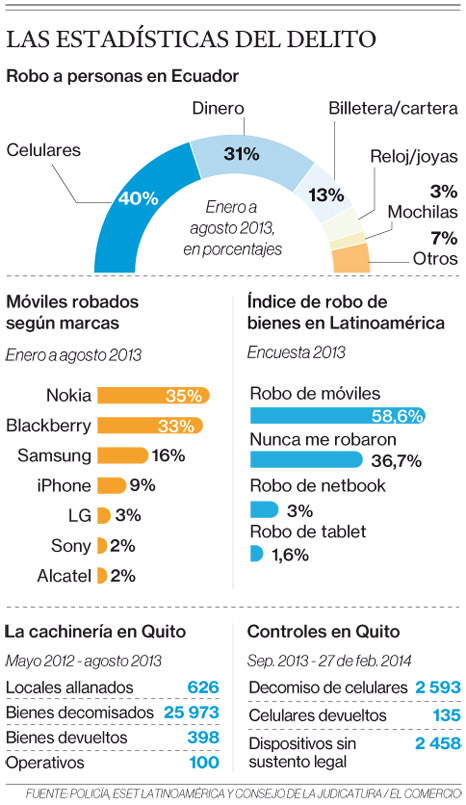
Transnational criminal networks in Latin America reportedly make an average of $550,000 a day selling stolen cell phones, highlighting the potential profits to be made in a trade that appears to be increasingly sophisticated.
A report by international police body Interpol accessed by El Comercio has shed light on the networks operating in the region, which traffic the phones by air or by land between Latin American countries including Peru, Colombia, Venezuela, Chile, Ecuador, Brazil and Mexico.
There are currently 14 million cell phones whose IMEIs (a unique number identifying each phone) are found on a list of stolen phones in just the Andean countries of Ecuador, Colombia, Peru and Bolivia, according to Fabian Jaramillo, Ecuador’s superintendent of telecommunications. Of these, four million are from Ecuador.
 Solen cell phones for sale in Ecuador are often trafficked from Peru and Colombia. According to police, upon arrival, the stolen phones are stored, their IMEI is changed and the reports of theft are wiped. The phones are then sold to both legitimate and illegitimate businesses.
Solen cell phones for sale in Ecuador are often trafficked from Peru and Colombia. According to police, upon arrival, the stolen phones are stored, their IMEI is changed and the reports of theft are wiped. The phones are then sold to both legitimate and illegitimate businesses.
Police say it is easiest to change the IMEI of Android phones in Ecuador, while changing the identification code of Blackberries and Nokia phones is usually done in Colombia.
Last year, Ecuador’s national customs body (SENAE) reportedly seized $2.5 million worth of cell phones.
InSight Crime Analysis
The apparent geographical scope of the cell phone trade in South America indicates the operations of these rings involve some level of sophistication. Cell phone theft is an extremely common street crime — representing 40 percent of personal robberies in Ecuador between January and August 2013 — but transnational trafficking of the goods requires numerous contacts at various links in the chain.
According to Interpol, this chain has five main components: the assailant, the technician who modifies the IMEI, the person who enters the country without paying taxes for the goods, the salesman and the client.
While phones stolen on the streets of South American nations often enter the black market of that same nation, transnational trafficking appears to be a growing and evolving phenomenon. It may also be easier for criminal groups to put a facade of legitimacy on sales in neighboring countries, depending on the cell phone operating system.
The trade has become a major issue in Latin American countries where phones are stolen and trafficked. In Colombia’s capital city of Bogota, one handset is stolen every two minutes, according to reports, and many of the robberies are fatal.
- Ecuador
- Colombia
- Peru











